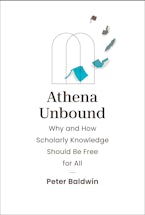
Open access initiatives
Much like our parent institution, the MIT Press thrives on creative excellence and effective entrepreneurship. As we work “daily to reimagine what a university press can be,” we strive to disrupt restrictive modes of scholarship and redefine scholarly publishing for the 21st century.
Our dedication to innovation is why we were among the first publishers to embrace digital catalogs and ebooks. It is what led to our launching, with the MIT Media Lab in 2018, Knowledge Futures, now a transformative platform developer for open access tools, which includes the PubPub content platform. It is what inspired Direct to Open, a sustainable and scalable open access publishing model that harnesses the collective power of libraries around the globe and has published over 160 open access books in its first two years.
This commitment to reducing barriers to scholarship continues to inspire our work along new lines of inquiry in scholarly communications and open access publishing.
If you would like to learn more about open access initiatives at the MIT Press, please contact Nick Lindsay, director of journals and open access, at nlindsay (at) mit.edu.
MIT Open Publishing Services
MIT Open Publishing Services (MITops) is a scholar-focused, MIT-branded hosting and publishing services operation. Working with our partner Knowledge Futures, we provide a portfolio of professional publishing consultation and support to mission-aligned partners.
Our inaugural project, launched in February 2022, is the SERC Case Studies Series from MIT’s Schwarzman College of Computing. This set of cases places readers in various settings that challenge them to consider the social and ethical implications of computing technologies, such as how social media services and surveillance tools are built; the racial disparities that can arise from deploying facial recognition technology in unregulated, real-world settings; the biases of risk prediction algorithms in the criminal justice system; and the politicization of data collection.
We will continue to expand our partnerships within and beyond MIT through upcoming projects like the digital and print distribution of a CSAIL anniversary report, the MIT Emerging Technology Case Studies, and a collection of papers from the MIT community on Generative AI.
Knowledge Futures/PubPub
Founded in 2018 as a partnership between the MIT Press and the MIT Media Lab, Knowledge Futures was created to build sustainable tools and technologies for libraries, presses, museums, activist organizations, researchers, and others whose knowledge work seeks to serve collective understanding and the public. What began as a handful of grad students working on publishing tools has grown into an independent, nonprofit organization that builds products that demonstrate an effective, equitable, and sustainable knowledge economy is possible.
They are also our regular collaborator on projects ranging from new open access journals (Harvard Data Science Review, Rapid Reviews\Infectious Diseases), books (Frankenbook, Data Feminism, the Understanding Pandemics, Epidemics, & Their Effects collection), and MITops.
Books about open access
The only thing better than publishing open access books is publishing books that are both open access and about open access. We are proud to publish new books that contribute to our understanding of open access, open data, and open science topics.

Open Access
2012-07-20

Athena Unbound
2023-03-28

Copyright's Broken Promise
2022-12-06

Knowledge Justice
2021-04-13

Knowledge Unbound
2016-03-25

Open Knowledge Institutions
2021-08-03

The End of Ownership
2018-03-16

Living Books
2021-08-31

Open Space
2017-12-15

Ownership of Knowledge
2023-07-18

Reassembling Scholarly Communications
2020-10-20

Shadow Libraries
2018-05-04

For Fun and Profit
2017-08-11

Making Open Development Inclusive
2020-08-25
Support open access
We are grateful to the many partners who have supported the open access mission at the MIT Press over the years.
In May 2023, we announced the establishment of the Arcadia Open Access Fund to support open access books and journals in science and technology, social sciences, arts, and humanities. This fund is made possible by an outright endowment gift of $5 million from Arcadia, who has also provided a $5 million “challenge” gift to incentivize other funders by matching their support of MIT’s open publishing activities.
Learn more about how you can support open access at the MIT Press.


